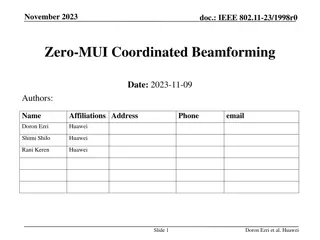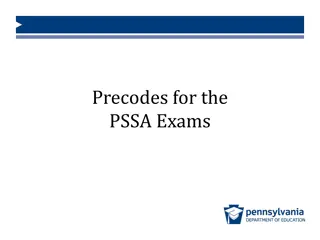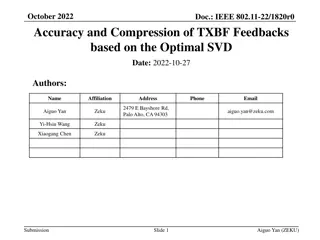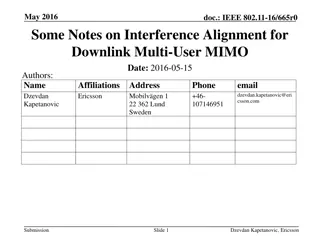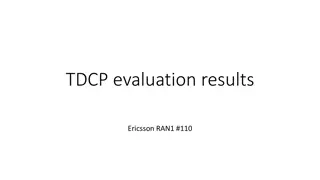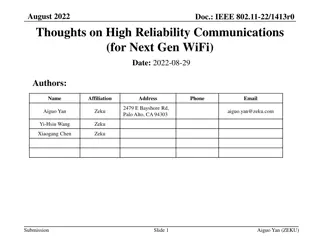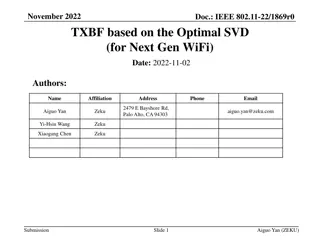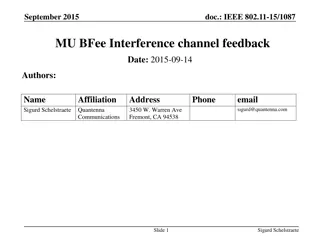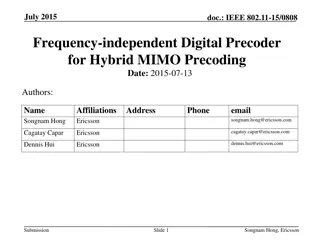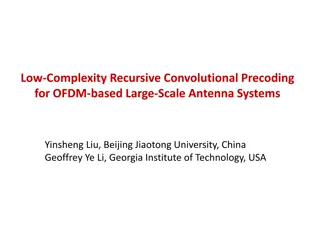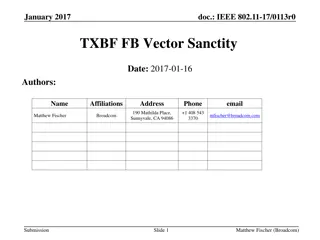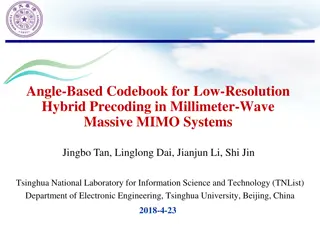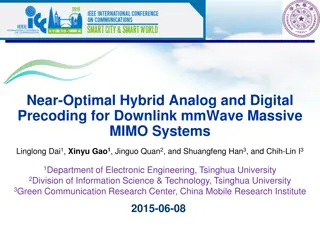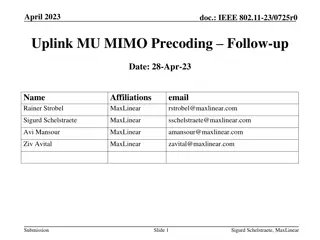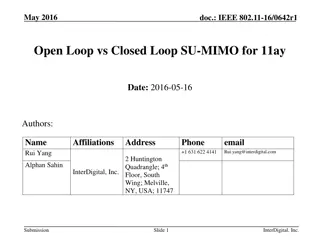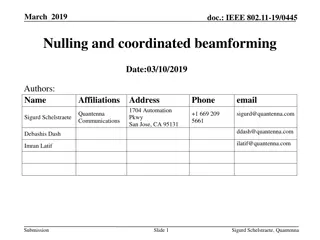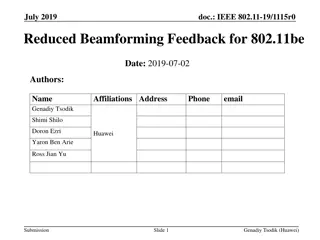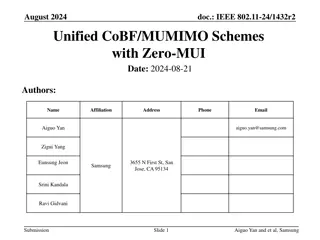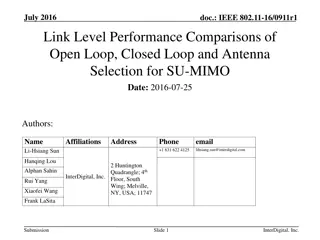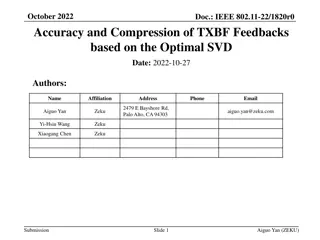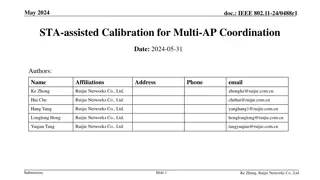Coordinated Beamforming and MU-MIMO in IEEE 802.11-23/1998r0
This document delves into the intricacies of Coordinated Beamforming (Co-BF) and MU-MIMO techniques in the context of IEEE 802.11-23/1998r0 standard. It explores the concept of nulling in Co-BF, handling more Rx antennas than streams, Zero-Forcing precoding to eliminate Multi-User Interference (MUI)
3 views • 22 slides
PSSA Exams Precodes Overview and Data Flow
The provided content discusses the process of precoding for PSSA exams, including agenda, timeline, data submission to PIMS, internal snapshot details, and data flow through Pennsylvania Information Management System (PIMS). It emphasizes the importance of ensuring data accuracy and meeting submissi
0 views • 30 slides
IEEE 802.11-22/1820r0: Accuracy and Compression of TXBF Feedbacks
This document discusses the accuracy and compression of Transmit Beamforming (TXBF) feedbacks based on Optimal Singular Value Decomposition (SVD). It covers the background, optimal SVD-based TXBF feedback (Decimation), simulation results, and proposals for overhead reduction schemes in the context o
4 views • 17 slides
Enhancing DL MU-MIMO with Improved Precoding Techniques
In this document, Dzevdan Kapetanovic from Ericsson discusses the limitations of standard DL MU-MIMO precoding for BPSK and proposes enhanced precoding and decoding methods for better performance. By applying these strategies to complex-valued alphabets, significant improvements are observed based o
3 views • 12 slides
Wireless Communication Evaluation Results and Channel Characteristics Analysis
This content discusses TDCP evaluation results in Ericsson RAN1, comparing precoding based on reciprocity versus CSI feedback. It also explores autocorrelation versus Doppler shift, Doppler spread estimation based on channel peaks, and proposed descriptions for AltA and AltB methods. The analysis de
1 views • 6 slides
Insights on Improving Reliability in Next-Gen WiFi Networks
Delve into enhancing reliability in next-generation WiFi networks through optimization strategies focusing on key areas like MIMO/TXBF concerns, throughput/data rate improvements, and reducing overhead feedback. Explore ways for the WiFi community to collaboratively address existing challenges and i
1 views • 12 slides
Optimal SVD Based TXBF for Next-Gen WiFi Development
This November 2022 document focuses on the application of Optimal Singular Value Decomposition (SVD) in Transmit Beamforming (TXBF) for the next generation of WiFi standards. It discusses the background, objectives of UHR/SG, advantages of Optimal SVD-based TXBF, simulation results, and potential ch
0 views • 14 slides
Managing Channel Information for Wireless Communication Systems
This document from September 2015 discusses issues related to updating channel information in wireless communication systems, focusing on MU-MIMO and TxBF precoding techniques. It explains the challenges of channel aging, the importance of refreshing channel information, and the impact of different
1 views • 16 slides
Unified CoBF/MUMIMO Schemes with Zero-MUI
This document discusses IEEE 802.11-24/1432r0, presenting unified Coordinated Beamforming/Multi-User Multiple Input Multiple Output schemes achieving Zero-Interference utilizing precoding. The contribution outlines the need for advanced receivers, equivalence between Zero Forcing and Block Diagonali
0 views • 20 slides
Unified CoBF/MUMIMO Schemes with Zero-MUI
This document discusses IEEE 802.11-24/1432r0, focusing on Unified Coordinated Beamforming (CoBF) and Multi-User Multiple Input Multiple Output (MUMIMO) schemes with zero Multi-User Interference (MUI). It explores the use of precoding techniques to achieve zero MUI, highlighting the equivalence betw
0 views • 23 slides
Frequency-Independent Digital Precoder for Hybrid MIMO Precoding
This presentation delves into hybrid beamforming with a focus on digital precoding stages for optimal performance. The investigation explores suboptimal choices and feedback reduction impact on performance. It discusses analog and digital precoding, optimal antenna phase shifts, codebook-based analo
0 views • 14 slides
Frequency-Independent Digital Precoder for Hybrid MIMO
Investigate the impact of suboptimal digital precoder choices on hybrid beamforming performance and feedback reduction. The presentation discusses two-stage precoding, optimal antenna phase shifts, codebook-based selection, and optimizing digital precoders for subcarriers.
1 views • 15 slides
Beam Selection for Hybrid MIMO Precoding
Investigating beam selection for hybrid precoding in IEEE 802.11ay with a focus on optimal beam selection based on MIMO modes, simulation results, and implications for performance. The presentation covers hybrid beamforming, motivation, optimal beam selection, and more.
0 views • 28 slides
Low-Complexity Recursive Convolutional Precoding for OFDM-based Large-Scale Antenna Systems
Explore the novel approach of low-complexity recursive convolutional precoding for optimizing OFDM-based large-scale antenna systems. Discover how this technique revolutionizes traditional FD precoding for enhanced efficiency and reduced complexity, offering insights into system models, performances
0 views • 17 slides
TXBF FB Vector Sanctity
This document dated January 2017, authored by Matthew Fischer from Broadcom, discusses the TXBF FB (Transmit Beamforming Feedback) Vector Sanctity in IEEE 802.11 technology. The content provides insights into the intricate details of vector sanctity related to wireless communication systems, particu
0 views • 13 slides
Angle-Based Codebook for Low-Resolution Hybrid Precoding in Millimeter-Wave Massive MIMO Systems
This study explores the use of angle-based codebook for low-resolution hybrid precoding in millimeter-wave massive MIMO systems, aiming to optimize performance while reducing energy consumption. The research delves into the technical background, angle-based codebook design, performance analysis, sim
0 views • 21 slides
Capacity-Approaching Linear Precoding for Large-Scale MIMO Systems
Capacity-approaching linear precoding methods with low complexity are crucial for enhancing the performance of multi-user large-scale MIMO systems. This study explores the advantages, challenges, and various precoding schemes in the context of large-scale MIMO technology, emphasizing the need for ef
0 views • 20 slides
Hybrid Analog and Digital Precoding for mmWave Massive MIMO Systems
Explore the near-optimal hybrid analog and digital precoding techniques for downlink mmWave massive MIMO systems. Learn about the advantages of using short wavelengths and massive MIMO technology, as well as the implementation of hybrid precoding to improve performance while reducing hardware comple
0 views • 17 slides
Enhancing SU-MIMO Performance in IEEE 802.11-16: Closed Loop Insights
Explore the improvements in Single User Multiple Input Multiple Output (SU-MIMO) transmissions within the IEEE 802.11-16 standard. Discover the benefits of Closed Loop SU-MIMO with quantized feedback compared to Open Loop SU-MIMO. Learn about baseband precoding methods and simulation assumptions for
0 views • 12 slides
IEEE 802.11-17/1689r1 Hybrid Beamforming Protocol Design Details
Explore the details of the Hybrid Beamforming Protocol design discussed in the November 2017 documentation for IEEE 802.11-17/1689r1. The protocol supports digital baseband training, hybrid precoding, and includes phases like Announcement, Sounding, and Feedback. Learn about the phases and concepts
0 views • 15 slides
Advanced Uplink MU-MIMO Precoding Techniques in IEEE 802.11 for Improved Performance
Explore the latest advancements in uplink MU-MIMO precoding presented in the April 2023 IEEE 802.11 document. Discover how these techniques enhance uplink rate and reliability through detailed simulations and performance comparisons. Learn about MAC overhead, channel aging effects, nonlinear receive
0 views • 19 slides
Potential Benefit of Closed Loop SU-MIMO for 11ay Communication
Demonstration of the benefits of closed loop SU-MIMO over open loop SU-MIMO in mmWave communication through system level simulations with different antenna configurations and deployment scenarios. Explore the impact of inter-stream interference and the effectiveness of channel-dependent precoding in
0 views • 12 slides
Enhancing Performance of Hybrid-ARQ with Linear Constellation Precoding
Explore a novel hybrid-ARQ scheme using linear constellation precoding that outperforms existing schemes like Code combining and Constellation rearrangement. The scheme shows improved packet error rate performance and transmission throughput across various SNR values. Discover the detailed compariso
0 views • 16 slides
Understanding Coordinated Beamforming in IEEE 802.11 Networks
Explore the concept of coordinated beamforming as introduced in IEEE 802.11-19/0445 documents. Learn about nulling and coordinated beamforming techniques, their applications, challenges, and the impact on network performance. Gain insights into the process of nulling with digital beamforming and the
0 views • 11 slides
Enhancing Beamforming for Next-Generation Wireless Communication
Explore the challenges and innovations in beamforming for IEEE 802.11be standard, focusing on increased spatial streams and MU-MIMO groups. Addressing the impact of larger precoding matrices while maintaining backward compatibility, the study delves into optimizing existing beamforming schemes for i
0 views • 14 slides
IEEE 802.11 MIMO Calibration Analysis
Explore the detailed analysis of MIMO calibration for IEEE 802.11 standards in March 2015. The document covers topics such as MIMO box calibration, per-tone SINR processing, precoding matrix decisions, MMSE receiver assumptions, and more, providing valuable insights into wireless communication stand
0 views • 12 slides
Unified CoBF/MUMIMO Schemes for Zero-MUI in IEEE 802.11-24/1432r2 August 2024 Document
Explore the innovative unified Coordinated Beamforming (CoBF) and Multi-User Multiple Input, Multiple Output (MUMIMO) schemes discussed in the IEEE 802.11-24/1432r2 document dated August 2024. The document proposes Zero Multi-User Interference (Zero-MUI) achievement through precoding techniques, emp
0 views • 20 slides
IEEE 802.11-16/0911r1 Link Level Performance Comparisons & Configurations
Explore the performance of open-loop, closed-loop, and antenna selection for SU-MIMO in IEEE 802.11-16/0911r1 document from July 2016. The study delves into baseband precoding methods, simulation assumptions, and simulated SU-MIMO configurations with beamforming implementations. Gain insights into t
0 views • 14 slides
Optimal SVD for TXBF Feedback Compression in IEEE 802.11-22
Explore the efficient compression of TXBF feedbacks leveraging Optimal Singular Value Decomposition in IEEE 802.11-22 standards. Delve into background, simulation results, and proposals for reducing overhead in CSI feedback. (Word count: 33)
0 views • 17 slides
Implicit Channel Estimation for IEEE 802.11: Performance Analysis
Explore the performance of implicit channel estimation in IEEE 802.11 networks for reducing sounding overhead. The study compares implicit and explicit sounding protocols, evaluates precoding performance, and discusses the use of implicit channel estimates. Experimental setups, calibration methods,
0 views • 16 slides
STA-Assisted Calibration for Multi-AP Coordination in IEEE 802.11-24
Explore a method of STA-assisted calibration for multi-AP coordination in the context of IEEE 802.11-24. This approach addresses synchronization challenges and aims to enhance the performance of multi-AP deployments, especially in scenarios with non-ideal synchronization and backhaul conditions. By
0 views • 13 slides
